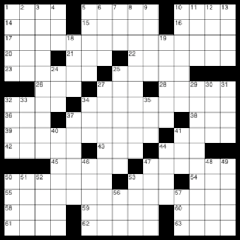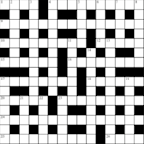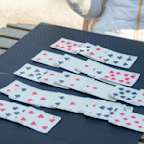Search results
Results From The WOW.Com Content Network
Markiplier (real name: Mark Fischbach) hosts “Distractible” with two of his longtime friends: Wade Barnes (whom “I think I’ve known since the sixth grade,” Fischbach says) and Bob ...
On 18 August 1942, a day before the Dieppe raid, 'Dieppe' appeared as an answer in The Daily Telegraph crossword (set on 17 August 1942) (clued "French port"), causing a security alarm. The War Office suspected that the crossword had been used to pass intelligence to the enemy and called upon Lord Tweedsmuir, then a senior intelligence officer ...
A code word is a word or a phrase designed to convey a predetermined meaning to an audience who know the phrase, while remaining inconspicuous to the uninitiated. For example, a public address system may be used to make an announcement asking for "Inspector Sands" to attend a particular area, which staff will recognise as a code word for a fire or bomb threat, and the general public will ignore.
Acrostic (puzzle) An acrostic is a type of word puzzle, related somewhat to crossword puzzles, that uses an acrostic form. It typically consists of two parts. The first part is a set of lettered clues, each of which has numbered blanks representing the letters of the answer. The second part is a long series of numbered blanks and spaces ...
Joining puzzle fans' morning rotations of the crossword, Wordle, and Connections is Strands, the New York Times' latest puzzle. Available to play online, Strands initially looks like a word search.
The solver is given a grid and a list of words. To solve the puzzle correctly, the solver must find a solution that fits all of the available words into the grid. Generally, these words are listed by number of letters, and further alphabetically. Many times, one word is filled in for the solver to help him or her begin the game.
Android. Release. February 15, 1942; 82 years ago. ( 1942-02-15) Genre (s) Word game. Mode (s) Single-player. The New York Times Crossword (marketed as The Crossword) is a daily American-style crossword puzzle published in The New York Times as part of The New York Times Games, online on the newspaper's website, syndicated to more than 300 ...
Roman numerals: for example the word "six" in the clue might be used to indicate the letters VI; The name of a chemical element may be used to signify its symbol; e.g., W for tungsten; The days of the week; e.g., TH for Thursday; Country codes; e.g., "Switzerland" can indicate the letters CH; ICAO spelling alphabet: where Mike signifies M and ...
Code word (communication) In communication, a code word is an element of a standardized code or protocol. Each code word is assembled in accordance with the specific rules of the code and assigned a unique meaning. Code words are typically used for reasons of reliability, clarity, brevity, or secrecy.
The Allied military phonetic spelling alphabets prescribed the words that are used to represent each letter of the alphabet, when spelling other words out loud, letter-by-letter, and how the spelling words should be pronounced for use by the Allies of World War II. They are not a "phonetic alphabet" in the sense in which that term is used in ...








